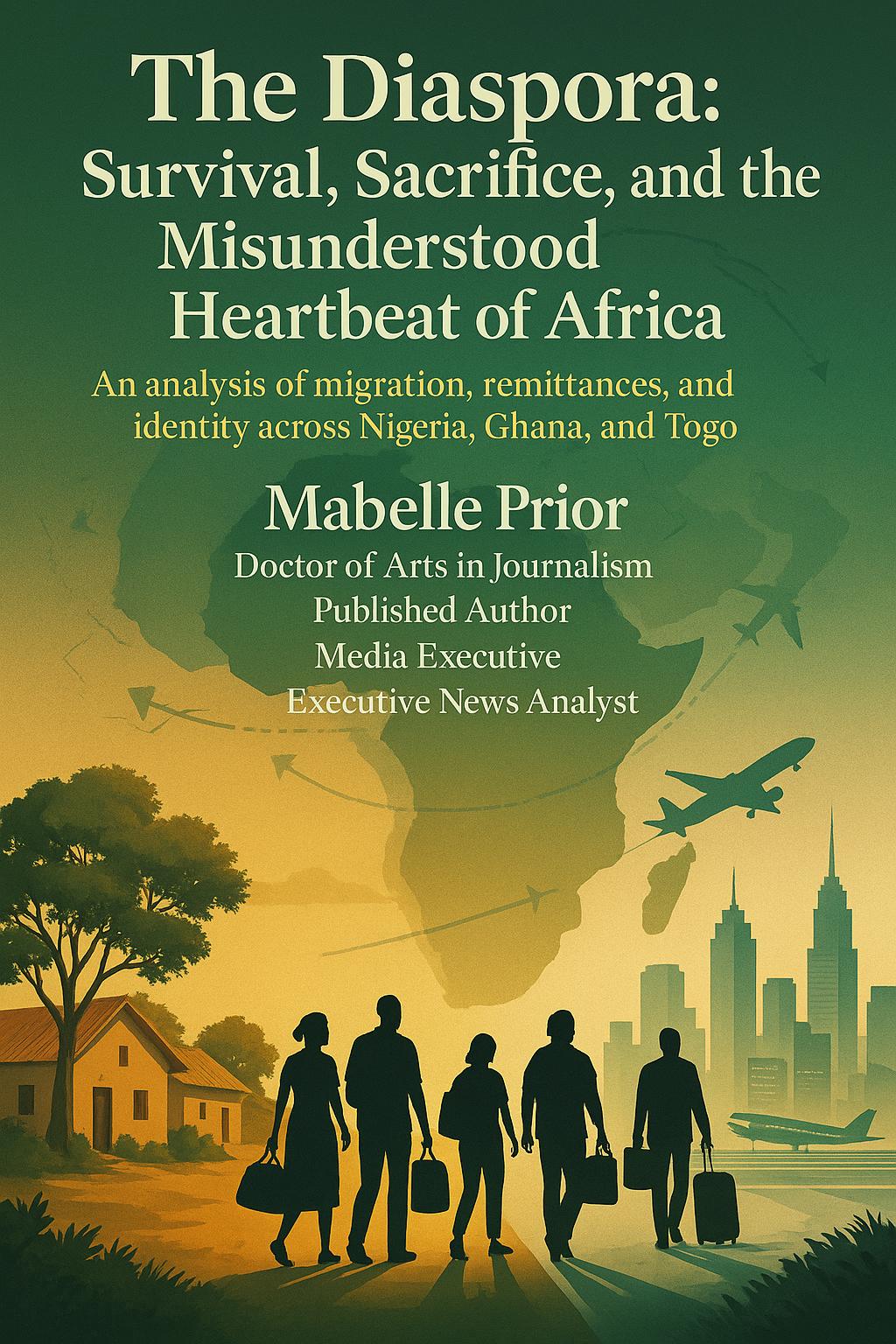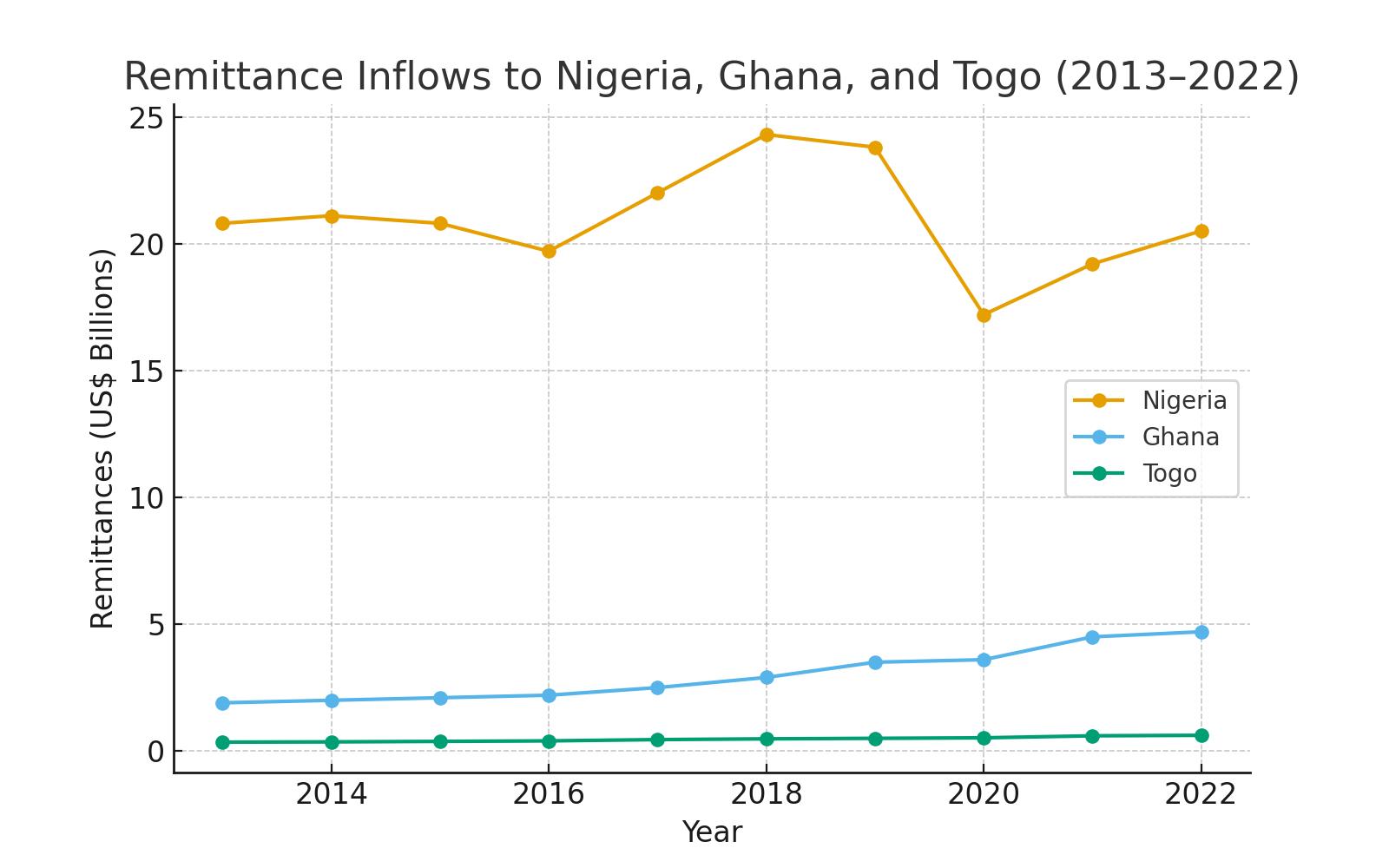Abstract
This paper examines the complexities of the African diaspora, challenging narratives that portray migration as betrayal. It explores the structural failures—corruption, fragile health systems, and economic instability—that push Africans abroad, contrasting them with the discipline and resilience required to integrate into structured societies. Using Nigeria, Ghana, and Togo as case studies, it highlights how remittances—often surpassing foreign direct investment—sustain families and economies. The essay argues that diaspora identity is not diminished by distance, and that remittances act as lifelines of survival, education, and development. Ultimately, it calls for a rethinking of freedom, identity, and loyalty, recognizing diaspora communities as builders, not traitors, and as the heartbeat of Africa across the world.
Preface
The African diaspora has long been misunderstood, often accused of abandoning their roots while quietly sustaining millions of lives across the continent. This work was inspired by years of observation and dialogue with migrants, families left behind, and policy experts. It seeks to give voice to the sacrifices of those who endure loneliness and prejudice abroad while remaining lifelines to their loved ones at home.
As a journalist and analyst, I have witnessed how narratives about migration are shaped by politics, culture, and sometimes prejudice. Yet behind statistics are human beings—mothers, fathers, sons, and daughters—who carry their cultures in their hearts and invest their earnings in schools, hospitals, and small businesses that governments have failed to provide.
This essay is both a critique and a tribute: a critique of broken systems that drive migration, and a tribute to the resilience of Africa’s diaspora survivors. My hope is that it will spark a more honest conversation about migration, identity, and development—one that celebrates rather than vilifies the diaspora.
— Mabelle Prior
The Diaspora: Survival, Sacrifice, and the Misunderstood Heartbeat of Africa
Introduction
Migration is one of the defining realities of Africa’s modern history. The African diaspora occupies a paradoxical position: admired for its economic contributions yet vilified by some as disloyal. Critics argue that those who leave abandon their homeland, while defenders highlight the sacrifices and lifelines migrants provide. To vilify the diaspora is to misunderstand its role: migration is not betrayal but resilience. This essay explores the push factors driving migration, the discipline required to survive abroad, the critical economic impact of remittances, and the misconceptions around identity, with comparative case studies from Nigeria, Ghana, and Togo.
Broken Systems and the Push Factors of Migration
Corruption and Failed Institutions
Weak institutions and systemic corruption are central to the push factors driving migration. In many African states, public services move only by patronage—“who you know” matters more than rights or merit. Such corruption not only erodes trust in government but also distorts development and deepens inequality.
Fragile Social Welfare and Health Care
Healthcare systems are chronically underfunded. In Nigeria, the doctor-patient ratio is about 1:5,000, far below the World Health Organization’s recommended 1:600. Even wealthy elites often seek medical care abroad. Similarly, across the region, the elderly are frequently neglected, with weak pensions and social safety nets.
Economic Instability
Unemployment and underemployment among youth remain high. In Ghana, youth unemployment was nearly 19% in 2021, with underemployment affecting almost half of young people. In Togo, persistent authoritarian governance has limited opportunity and discouraged investment, fueling emigration. Inflation, insecure banking systems, and withheld salaries exacerbate these conditions.
Integration Abroad: Discipline and Sacrifice
Life abroad demands humility, discipline, and resilience. Migrants must adjust to structured societies where laws apply to all and systems—from trains to courts—do not bend to privilege. They endure racism, loneliness, and identity struggles, yet many still prefer these challenges to the insecurity and corruption at home. Survival abroad becomes an act of sacrifice not just for oneself but for family and nation.
The Economic Lifeline: Remittances
Magnitude of Remittances
Remittances from the diaspora surpass foreign direct investment (FDI) and official development assistance (ODA) in many African countries. Sub-Saharan Africa received US$49 billion in 2021 and over US$92 billion in 2024. Globally, remittance flows to low- and middle-income countries reached US$685 billion in 2024, underscoring their scale.
Figure 1: Remittance inflows to Nigeria, Ghana, and Togo (2013–2022).
Impacts on Families and Development
These funds pay for education, healthcare, housing, and small businesses, serving as lifelines for millions. They reduce poverty, improve household resilience, and stabilize fragile economies.
Table 1: Remittances as a percentage of GDP (2022).
Case Studies
Nigeria
Nigeria demonstrates the scale of diaspora contributions in large economies. With remittance inflows exceeding US$20 billion annually, the Nigerian diaspora is the largest in Africa. These inflows account for about 4% of GDP and fund education, healthcare, and business ventures. Yet insecurity, corruption, and high transfer costs undermine fuller engagement. The establishment of the Nigerian Diaspora Commission (NiDCOM) reflects recognition of diaspora potential, though challenges persist.
Ghana
Ghana offers an example of how stable democracies can leverage diaspora networks. In 2022, Ghana received US$4.7 billion in remittances, about 6% of GDP. Initiatives like the Year of Return (2019) and the Diaspora Affairs Office have promoted engagement beyond financial flows, encouraging skills transfer and investment. However, bureaucracy, land disputes, and corruption still deter large-scale diaspora-driven development.
Togo
Togo highlights the role of remittances in smaller, fragile states. In 2022, Togo received US$616 million in remittances, nearly 9% of GDP. For many households, these inflows provide basic survival—food, healthcare, and housing—rather than entrepreneurial investment. Political repression and weak property rights discourage diaspora engagement, but communities abroad continue to fund opposition groups and civil society movements, linking remittances to both survival and political resistance.
Identity, Culture, and Misconceptions
Critics often accuse the diaspora of betraying identity or losing culture. Yet Africanness is not erased by borders, marriage, or migration. Identity is layered and adaptive, not diminished by mobility. The diaspora often preserves language, traditions, and values abroad while contributing materially to the homeland. When tradition is weaponized to shame or exclude diaspora members, it reinforces oppressive systems rather than liberates.
Conclusion
The African diaspora is not a community of deserters but of survivors, builders, and protectors. Nigeria, Ghana, and Togo illustrate the diversity of diaspora dynamics: from large-scale inflows that rival FDI to survival remittances that sustain fragile states. Across contexts, the diaspora provides lifelines for households and economies, even as they endure racism, loneliness, and sacrifice abroad.
To vilify them is to vilify love expressed through sacrifice. What threatens Africa is not migration but corruption, insecurity, and exclusionary mindsets. Recognizing the diaspora as the heartbeat of Africa across the world is essential to the continent’s renewal.
References
Aboderin, I., & Beard, J. (2015). Older people’s health in sub-Saharan Africa. The Lancet, 385(9968), e9–e11.
Adebajo, A. (2021). Nigeria’s insecurity crisis: Causes and solutions. African Affairs, 120(479), 429–442.
Adebowale, N. (2021, September 27). Brain drain: One doctor to 5,000 patients in Nigeria — Medical association. Premium Times.
African Development Bank (AfDB). (2022). African Economic Outlook 2022: Supporting climate resilience and a just energy transition. Abidjan: AfDB.
Ahlijah, P. (2021). Authoritarian resilience in Togo: Dynastic rule and democratic stagnation. African Studies Review, 64(3), 512–530.
Akinsola, A. (2017). The political economy of corruption in Africa. Erasmus University Rotterdam. Akokpari, J. (2017). Healthcare and migration in Africa: A political economy perspective. Journal of Asian and African Studies, 52(3), 325–340.
Amankwah-Amoah, J., Danso, A., & Adomako, S. (2019). Corruption, business failure, and decoupling: A review and research agenda. Technological Forecasting and Social Change, 146, 725–734.
Appiah, K. A. (2018). The lies that bind: Rethinking identity. Liveright. Ghana Statistical Service. (2022). Quarterly Labour Force Report: Q4 2021. Accra: GSS. Ratha, D., Plaza, S., & Dervisevic, E. (2018). Migration and development: A role for the World Bank Group. World Bank Policy Research Working Paper 8318. RemitSCOPE. (2024). Remittances to Africa. International Fund for Agricultural Development. Transparency International. (2022). Corruption Perceptions Index 2022. Berlin: TI. World Bank. (2022). Migration and Development Brief 37. Washington, DC: World Bank. World Bank. (2023). Migration and Development Brief 39. Washington, DC: World Bank. World Bank. (2024). Migration and Development Brief 39. Washington, DC: World Bank.
Author’s Biography
Mabelle Prior, Doctor of Arts in Journalism Published Author · Media Executive · Executive News Analyst
Mabelle Prior is a seasoned journalist, published author, and media executive with an illustrious career dedicated to amplifying voices and promoting human rights. She began her pioneering journey in broadcast journalism at the Ghana Broadcasting Corporation’s Volta Star Radio in Ho, where she hosted programs advancing women’s and children’s rights.
In the early 2000s, she worked at Canal 3 FM Dialogue in Switzerland and became a respected advocate for women’s rights, eventually appearing on the cover of the Swiss newspaper Bieler Tagblatt for her activism. She also played a key role as a pioneer member of the Federative Committee of Women in Switzerland, championing inclusivity and empowerment.
Mabelle is the founder of Swiss Most Beautiful, a platform celebrating beauty, culture, and diversity. Today, she continues her work as a media executive and news analyst, blending journalism with advocacy to spotlight social justice, gender equity, and African development.


